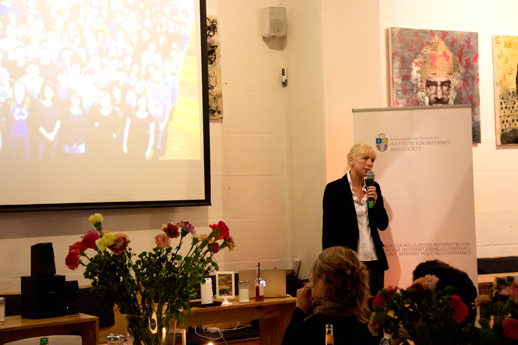Making sense of our connected world

How to hire the best people for your startup
The #1 HR challenge most startups talk about is recruiting. An entrepreneur’s job is to hire a world-class team. As soon as a small company grows, finding the right people becomes a major issue. On the occasion of our series Startup-Clinics Talks we invited Gitta Blatt, Head of HR at Wooga, Europe’s leading online and social games developer, as an expert. The event took place at betahaus. This Blogpost attempts to summarize some of the thoughts presented by Gitta.
Recruiting needs a change
The most crucial human resources issue for a founder is probably to find the first employees. These set and pass on standards and thereby influence the selection process of all employees that follow which in turn makes them responsible for the future success of a young company. Therefore, it is essential for every founder or founding team to place special emphasis on selecting the first employees.
Traditional job postings are akin when it comes to both structure and appearance. For that reason, they are likely not the best way to acquire new talent. For this reason better ways must be found. Successful recruitment for entrepreneurs and startups involves the use of personal networks. If an entrepreneur has a person as the ideal candidate in mind, he should contact him or her proactively. Even if he or she is not available at the end, they may have another appropriate recommendation. At Wooga, 40 % of the hired staff come from personal referrals. For this purpose, appropriate incentives are given and in case of a successful recommendation employees receive a highly individual and special gift (e.g.a weekend trip, a bungee-jump, a new TV, etc.) as an acknowledgement. Using your own personal network is probably one of your best sources for job leads in the digital industry.
Company Culture drives growth
 One of the most important startup assets is its culture. Having a great and positive company culture not only drives talent and company growth but is also essential for retaining employees and minimizing turnover. Woogas culture is built around values like ‘fun’ and ‘success’ which positivly influence each other. Success stories should also be part of the external presentation of a startup. Wooga uses channels such as Pinterest, Instagram, Somewhere and of course Facebook. As a result, Wooga receives numerous direct applications through social media from around the world. While not targeted at the masses but rather on quality candidates, University Relations can also help in the search for young talents. In summary, the three most important recruiting channels for Wooga are referrals, direct applications via social media and university relations. It can only be beneficial for a startup to focus on specific channels and not to lose itself in doing too many things at the same time.
One of the most important startup assets is its culture. Having a great and positive company culture not only drives talent and company growth but is also essential for retaining employees and minimizing turnover. Woogas culture is built around values like ‘fun’ and ‘success’ which positivly influence each other. Success stories should also be part of the external presentation of a startup. Wooga uses channels such as Pinterest, Instagram, Somewhere and of course Facebook. As a result, Wooga receives numerous direct applications through social media from around the world. While not targeted at the masses but rather on quality candidates, University Relations can also help in the search for young talents. In summary, the three most important recruiting channels for Wooga are referrals, direct applications via social media and university relations. It can only be beneficial for a startup to focus on specific channels and not to lose itself in doing too many things at the same time.
When in doubt, don’t hire
When it comes to recruitment and selection it is advisable that each new employee, regardless of his skills and abilities, needs to fit in the team. During the process it is recommended to seek feedback and involve other opinions. During the interview, a colleague may for example explain the job content instead of a supervisor. This is not only helpful for gaining credibility but also for illustrating that a manager does not have to “sell” the job. The highest person’s opinion itself should by no means be pivotal in the selection process. Quite the contrary: Challenging his or her opinion can only be beneficial.
Selection criteria at Wooga are team fit, creativity, motivation, performance orientation, degree of responsibility and decision making ability. In particular, it is worthwhile to look for any person acting out of great inner conviction. Beeing passionate is a key to success. Wooga has an extensive five-stage application process, which includes document check, Skype call, a test, full day onsite interview and in the end a personal interview with Gitta and Wooga founder Jens Begemann. This especially emphasizes how important the subject of recruitment is as a key success driver for Wooga. When in doubt, “don’t hire”. Even 95% is not enough.
Predictions and Summary
Gitta’s future projections are that blogs and social media will continue to gain relevance and the increase in mobile Internet usage is also going to affect the recruitment processes of startups. Employer Branding and a professional appearance in the digital media will be of great importance because the top talents are going to choose their employer in the future rather than the other way around. The awareness of diversity is continuously growing and at times of big data, so-called “workforce analytics” will become more and more important for human resources departments in startups. For Gitta neither money nor other material incentives are the reason for talents to choose their future jobs, but rather a complete package consisting of things like corporate culture, career prospects, individual responsibility and other important factors.
Startup-Clinics Talks
The Startup-Clinics Talks series is organized by a group of doctoral researchers from the Alexander von Humboldt Institute for Internet and Society. Experts in the areas of HR, Management, Finance, Law, Sales, Business Modeling and more will hold short speeches or give workshops about relevant startup topics and share their experience at different locations in Berlin.
This post is part of a weekly series of articles by doctoral canditates of the Alexander von Humboldt Institute for Internet and Society. It does not necessarily represent the view of the Institute itself. For more information about the topics of these articles and asssociated research projects, please contact presse@hiig.de.
This post represents the view of the author and does not necessarily represent the view of the institute itself. For more information about the topics of these articles and associated research projects, please contact info@hiig.de.

You will receive our latest blog articles once a month in a newsletter.
Research issues in focus
Escaping the digitalisation backlog: data governance puts cities and municipalities in the digital fast lane
The Data Governance Guide empowers cities to develop data-driven services that serve citizens effectively.
Online echoes: the Tagesschau in Einfacher Sprache
How is the Tagesschau in Einfacher Sprache perceived? This analysis of Reddit comments reveals how the new simplified format news is discussed online.
Opportunities to combat loneliness: How care facilities are connecting neighborhoods
Can digital tools help combat loneliness in old age? Care facilities are rethinking their role as inclusive, connected places in the community.




